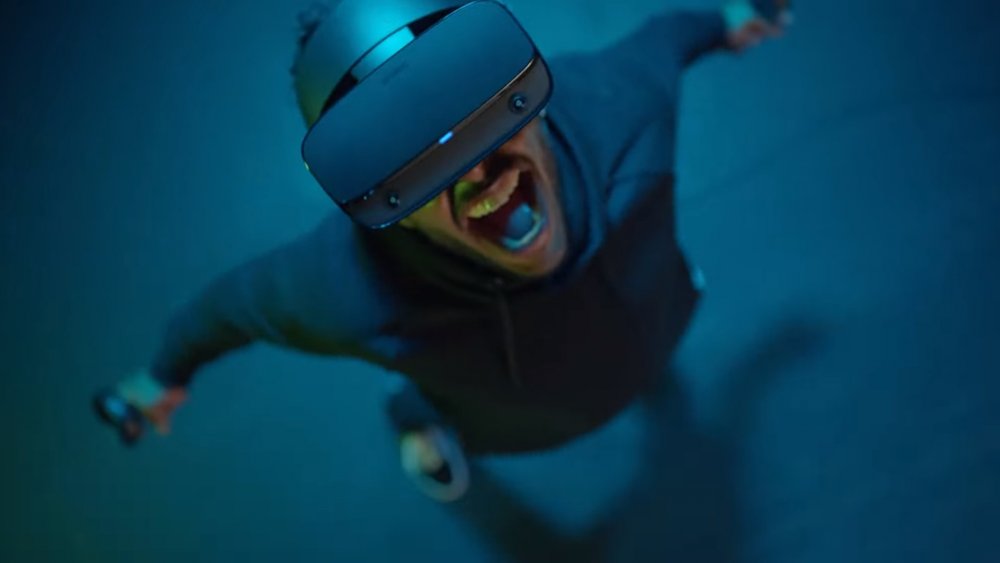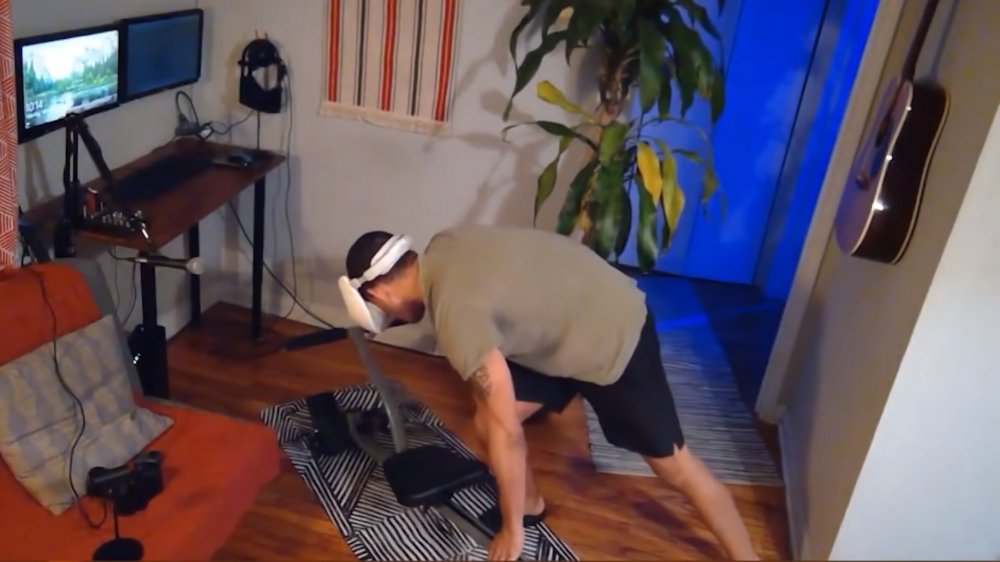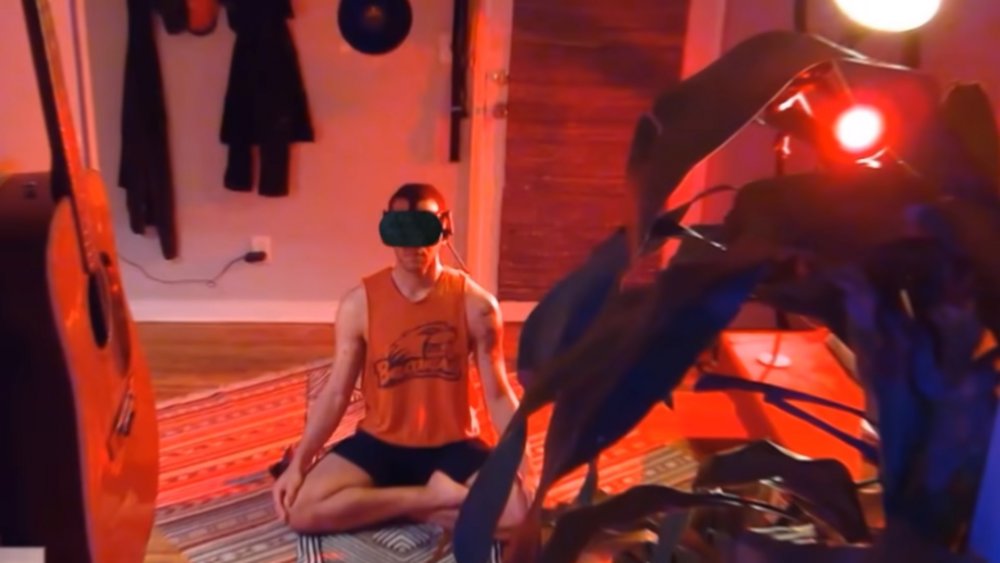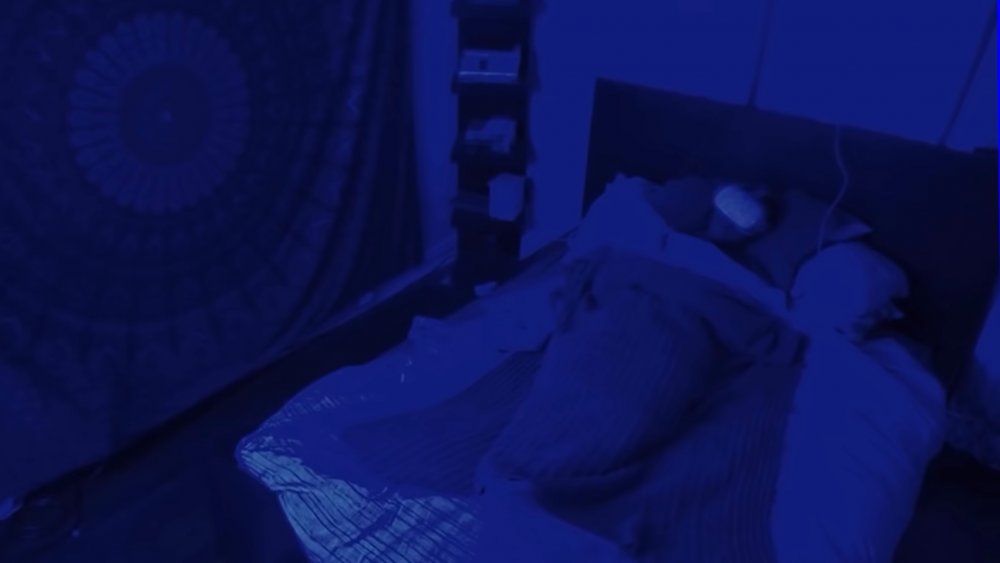When You Use A VR Headset Every Day, This Is What Happens To Your Body
Virtual reality (VR) is likely the future of gaming and will also play a key role in social interactions. Big-name studios are developing well-received VR titles (standout examples include Beat Saber, The Elder Scrolls 5: Skyrim VR, and Half-Life:Alyx). Plus, audiences have an ever-growing list of VR programs they can use to hang out with friends and conduct long-distance business meetings — which is far less painful than hopping on a plane or train for a meeting. However, with the spread of VR technology, you can't help but wonder what happens when you use it too much.
Every generation experiences new technology and pundits that warn against it. The world has lived through claims that sitting too close to the television rots your eyes, that constant cell phone use gives you brain cancer, and that Harry Potter promotes witchcraft. VR is the new kid on the block, and many are worried about the ramifications of extended use. After all, studies on rats show VR prevents their brains from creating mental maps of their surroundings. This raises the question of what happens when someone uses VR every day. That question is currently unanswerable since there's so little data on the subject.
All isn't lost, however, as one brave soul, co-founder of Disrupt VR Jak Wilmot, decided to spend a week wearing a VR headset. No breaks or anything, just 168 hours straight with a VR headset strapped to his head, and he has some fascinating experiences to share.
Healthy in body, healthy in mind
While Wilmot decided to spend a week in VR, he still needed to be a productive member of society. He had to eat, sleep, shower, work, and exercise. The entire experience featured a learning curve as actions most take for granted, like grabbing a coffee cup, are much more challenging in VR. But, Wilmot eventually got the hang of things.
Stress, the modern working person's nemesis, was no issue during Wilmot's adventure. If he needed to relax, he loaded a soothing virtual environment like a pleasant forest or a community meditation circle, and 10-15 minutes later he was ready to tackle the day. Moreover, exercising was easy in VR. Wilmot mastered energetic rhythm games, combined a rowing machine with a soothing beach simulation, and even visited Rocky Balboa's gym to take boxing lessons from the Italian Stallion himself.
Sleep was also a non-issue. Wilmot started every restful night in a virtual Netflix theater and drifted off to the sweet melodies of his binge watching queue.
To be fair, Wilmot is in good shape, but his experiment demonstrates that daily use of VR didn't appear to have any detrimental physical effects for him and even helped his stress levels. The right VR simulation can accentuate the experience and make a surprising difference.
Side effects may include déjà vu, loneliness, claustrophobia, and déjà vu
Even though constant VR use didn't appear to affect Wilmot's body, it did some freaky things to his mind. Some problems Wilmot experienced were maintainable, but others could be the new normal for VR aficionados.
Humans are social creatures and tend to abhor intense solitude by nature, which is what you get if you use VR solo. Wilmot felt the stinging bite of isolation only 24 hours into his adventure, and not even the most calming of simulations could cure it. However, after conversing with other VR users, Wilmot's loneliness melted away. Even the inherent claustrophobia that comes with VR use was lessen with a quick trip to a calming African Savannah simulation.
While Wilmot experienced some expected eye discomfort — which was fixed with a good night's rest — nothing could have prepared him for how VR altered his perceptions. Turns out round-the-clock VR completely wrecks your circadian rhythm, i.e., the natural process that regulates your sleep/wake cycle. Your body tells you to remain active when the sun is out and rest when the moon shows its face, but you can't exactly do that when giant VR goggles block your vision of outside light. Wilmot's sense of time went all topsy turvy, and he eventually experienced frequent déjà vu, which doesn't do any favors for anyone trying to keep track of time.
Do VR headsets dream of user interface sheep?
Wilmot spent so much time in a VR helmet his brain couldn't tell the difference between virtual reality and actual reality. Well, it could, but the subconscious part couldn't. Wilmot started to essentially dream in VR. The dreams weren't too different from the standard fare of flying through the skies and showing up for a test without pants, but they all featured VR user interface (UI) menus.
This isn't necessarily a bad thing, and Wilmot likened the experience to the Tetris effect (not to be confused with the game Tetris Effect) where constant exposure to a game colors your thoughts and pattern recognition skills. Still, people are used to having dreams that are completely detached from reality, so you can imagine how strange it is to have VR menus in your dreams, only to wake up and have your eyes greeted by more VR menus.
It's just as easy to exit the matrix as it is to enter
Wilmot's experiment only lasted one week, so after the allotted 168 hours, he took the VR headset off. And, you probably wonder what happened afterwards. Spending a week having his eyes constantly blasted with lights from miniature screens must have affected Wilmot's vision, right? Surprisingly no.
While Wilmot reported slight dizziness and disorientation after taking off the VR helmet, he quickly adjusted. In 24 hours, he experienced zero eye-strain or headaches. His initial problems stemmed from his eyes readjusting to the framerate of reality, which is infinitely higher than that of VR, as well as the larger field of view (FOV) that comes with not attaching a hi-tech computer screen to one's face.
Wilmot's experiment demonstrates that using VR headsets for hours at a time and for days on end probably won't have any long-lasting impacts. Then again, he is only one person, and questions like these deserve large studies since one man's experience is hardly representative of any demographic.





